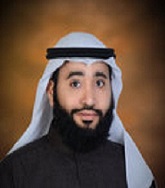Organizing Committee Member

M.A.Alnafea
Director of Radiologic Sciences Dept and Vice dean for Academic affair in the College of Applied Medical Sciences
King Saud University, SA
Saudi Arabia
Biography
M. A. Alnafea worked, taught, and trained in many local and international hospitals as a medical imaging technologist and a medical physicist. He has completed his PhD at the age of 33 years from the university of Surry, UK and postdoctoral studies from King Saud University. He then worked as Assistance Professor then as director of Radiologic Sciences Dept. for 2 years, He then worked for two years as Vice dean for Academic affair in the College of Applied Medical Sciences. He then worked as consultant at the ministry of higher education, vice ministry for scholarship, medical education department (2011-2015). Sense June 2015 he has being working as an academic and researcher. His Current research projects supported by the National Science, Technology and Innovation Plan (NSTIP) and King Abdulaziz City for Science and Technology. He is the Principal Investigator and Project Manager and the title of the current project: Development of a proof-of-concept demonstration system for 3D coded aperture Scintimammography.
Research Area
Breast problems, such as lumps, pain, nipple discharge, and changes in the skin of the breast, and cancer are common in women of all ages, from adolescents to old ages. These considered important health problems that may cause death in women in Saudi Arabia and worldwide. The current and the most cost effective imaging technique used for screening and diagnosis of breast abnormality is X-ray mammography. It is often used for earlier detection, improving both prognosis and survival rate. Despite this, the mortality rate of breast diseases remains high worldwide and a large number of cases with positive mammography results undergo invasive surgical breast biopsies; which are often uncomfortable, stressful. Alternatively, scintimammography (SM) used as a complementary imaging method particularly for women with dense breast. Such imaging technique is generally undertaken using high-resolution parallel-hole collimators with Anger cameras. Unfortunately, this mode of imaging suffers a major drawback in detecting small lesions (less than 1 cm in diameter). These limitations are mainly due to resolution-efficiency trade-off that is inherent in the use of collimation. This study proposes to overcome this limitation by using a simple Coded Aperture (CA) mask, instead of the collimator. In other words, this work focus on development of a proof-of-concept demonstration system for a 3D CA. The promising simulation results and novel image decoding methods that have previously demonstrated. The simulation results showed that lesions as small as 3.0 mm were detectable compared to 8.0 mm with conventional camera. This will represent the first occasion that CA imaging for SM will have to be locally developed and hopefully physically tested under realistic imaging conditions. Given that conventional X-ray mammography exhibits relatively poor sensitivity and specificity for the younger age cohort affected by breast cancer within KSA compared to western populations. This method is ideally suited to the particular health needs of the kingdom. Future work will focus on overcoming the problem of the non-self-holding nature of the mask and further simulation needed to ensure that the addition of a holding material such as aluminium would not destroy the quality of the imaging system. The cutting and the building up of the mask was not straightforward due to a lack of local specialised companies in this field.